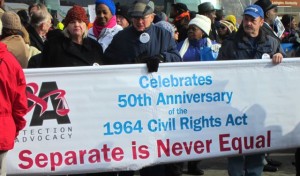Not so bad so far!
I have been scanning the usual media outlets for some clue about what went on at the Tuesday institutional town meetings that Jewish Hospital announced publicly last week. I am finding nothing, nor have I any idea what was discussed. I have a feeling that if something big had been revealed, that we would have heard of it by now. KentuckyOne and the University of Louisville continue to keep the lid on pretty tight.
What I did find was a YouTube video message from KentuckyOne’s CEO, Ruth Brinkley. It contained nothing particularly surprising or controversial. Its principal function appeared to be to calm employee anxieties that arise naturally during rapid institutional change. It begins by telling the “good news” that half of the $218 million budget deficit has been made up through the hard work and sacrifice of employees, although no details are offered. It restates the obvious, that major change takes time and is difficult. Employees were told that no further large-scale layoffs were anticipated.
Patient referrals and provider recruitment.
Other successes announced include increased referrals to system physicians and mid-level primary care providers through the “Anywhere Care” tele-health initiative or from referrals through HealthGrades. Fifty-eight new primary care providers of a variety of professions have been added to the network.
Employees are told they can help by speaking well of and conveying their pride in the organization to their family and friends. They are urged to select KentuckyOne primary care providers. Suggestions for cost-saving measures from employees are solicited with special recognition awarded for measures that are adopted. Much of the rest of the message is a restatement of the goals of the organization including improving the health of Kentuckians. It is noted that the challenges still facing KentuckyOne are not unique to it. [I agree.] Continue reading “Changes Coming to Downtown Louisville for KentuckyOne Health.”

